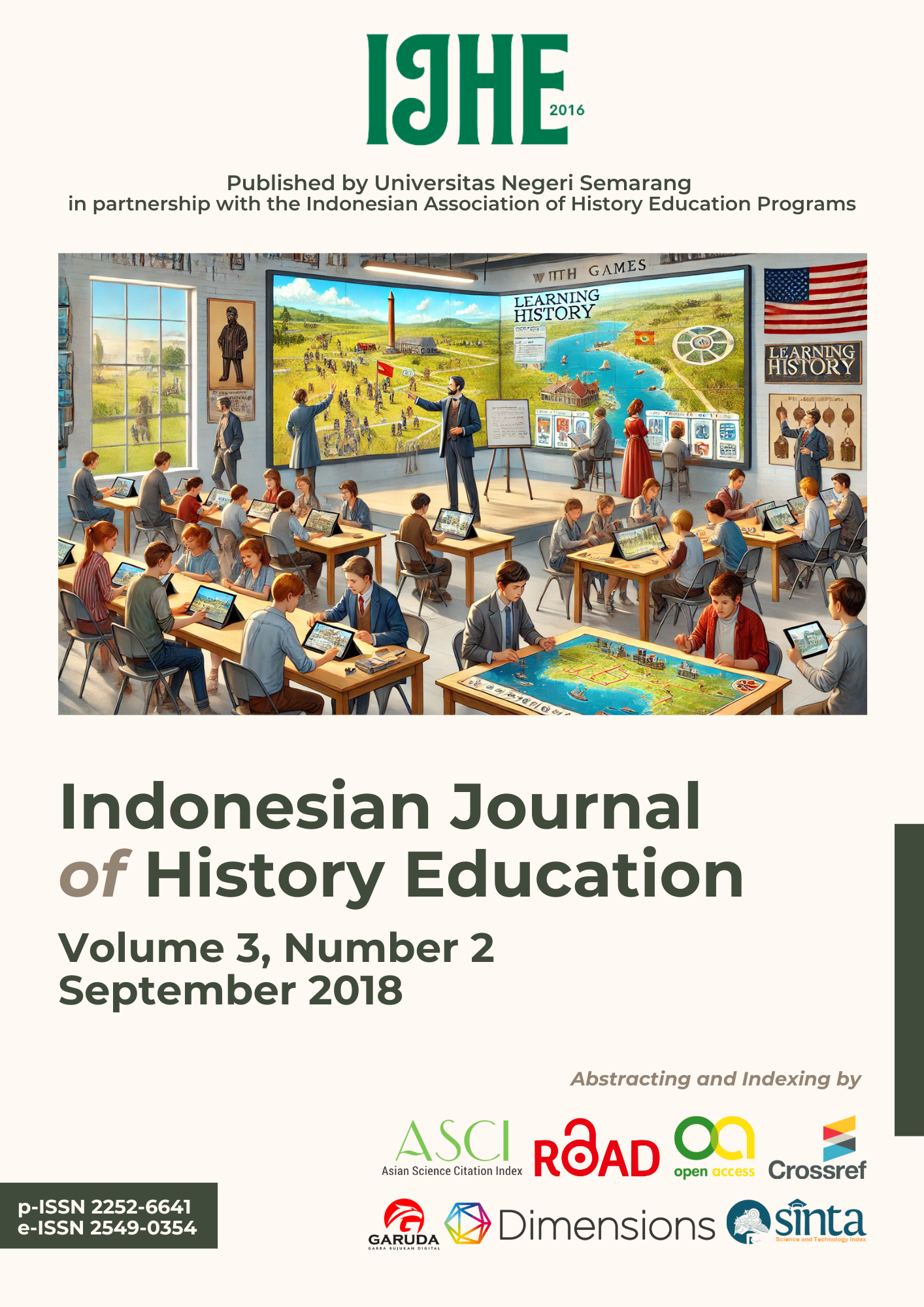Strategies, Problems, and Efforts to Synergize in Integrated Social Studies Learning in Grade VIII of SMP Negeri 2 Magelang Academic Year 2014/2015
Abstract
The study was conducted in the eighth grade in junior high school 1 Magelang, and data collection was done using in-depth interviews, observation, and documentation. Validation of data using triangulation techniques and triangulation of sources. Data analysis using three interactive models, namely data reduction (data reduction), data display (presentation of data), and verification (conclusion). The results showed that (1) teachers design learning strategies Integrated social science through the development of learning tools and technical preparation before the start of learning; (2) The internal problems that arise in the form of background learning teacher education is not education social studies and there are still students who are less concentrated in learning. The external problem that arises is the lack of infrastructure as well as the most burdensome in the form of a new curriculum policy that mandates delivery of achievement of the students in the form of descriptive; (3) Efforts to synergize learning that teachers are training and fellowship meeting of teachers; schools also facilitate the needs of teachers and students.
References
Arikunto, S. (2013). Dasar-Dasar Evaluasi Pendidikan. Bumi Aksara.
Aunurrahman. (2013). Belajar dan Pembelajaran. Alfabeta.
Dimyati, M., & Mudjiono. (2009). Belajar dan Pembelajaran. Rineka Cipta.
Djalal, F. (2017). Optimalisasi pembelajaran melalui pendekatan, strategi, dan model pembelajaran. SABILARRASYAD: Jurnal Pendidikan dan Ilmu Kependidikan, 2(1).
Hamalik, O. (2001). Proses Belajar Mengajar. Bumi Aksara.
Hamalik, O. (2008). Kurikulum dan Pembelajaran. Bumi Aksara.
Hasan, M. (2016). Evaluasi Pelaksanaan Kurikulum 2013 di Sekolah Piloting. Jurnal Evaluasi Pendidikan, 3(1), 87-98.
Hartono, Y. (2017). Pendidikan nasional dan kualitas manusia Indonesia dalam perspektif sejarah. Agastya: Jurnal Sejarah Dan Pembelajarannya, 7(2), 84-102.
Ibrahim, M. (2014). Hakikat kurikulum dan Pembelajaran. Modul Pembelajaran, 1-42.
Kurniawan, A. (2015). Implementasi Kurikulum 2013: Pengelolaan Pembelajaran IPS di SMP. Jurnal Pendidikan IPS, 3(2), 45-58.
Maryani, E., & Syamsudin, H. (2009). Pengembangan Program Pembelajaran IPS untuk Meningkatkan Kompetensi Keterampilan Sosial. Jurnal Penelitian, 9(1), 1-15.
Mustamin, A. A. B. (2017). Rekonstruksi Konsep Strategi Dan Perencanaan Dalam Pembelajaran. At-Ta'lim: Media Informasi Pendidikan Islam, 15(2), 372-387.
Nasution, S. (2009). Asas-Asas Kurikulum. Bumi Aksara.
Nurtanto, M. (2016). Mengembangkan kompetensi profesionalisme guru dalam menyiapkan pembelajaran yang bermutu. In Prosiding Seminar Nasional Inovasi Pendidikan (pp. 553-565).
Permendikbud Nomor 65 tahun 2013 tentang Standar Proses Tentang Pendidikan Dasar dan Menengah.
Permendikbud Nomor 68 tahun 2013 tentang Kurikulum Sekolah Menengah Pertama dan Madrasah Tsanawiyah.
Pramono, S. E. (2013). Hakikat Pendidikan Ilmu Pengetahuan Sosial. Widya Karya.
Rahayu, S. (2014). Peran Guru dalam Pembelajaran IPS: Studi Kasus di SMP Negeri Kota Yogyakarta. Jurnal Pendidikan Guru, 10(1), 87-102.
Sanjaya, W. (2012). Strategi Pembelajaran Berorientasi Standar Proses Pendidikan. Kencana Prenada Media Group.
Setiawan, A. (2013). Peran Pendidikan dalam Pembangunan Nasional. Jurnal Pendidikan Kewarganegaraan, 5(2), 87-98.
Sudjana, N. (2009). Dasar-Dasar Proses Belajar Mengajar. Sinar Baru Algensindo.
Suprayogi. (2011). Pengetahuan Ilmu Pengetahuan Sosial. Widya Karya.
Wibowo, B. (2013). Kurikulum 2013 dan Manajemen Pembelajaran IPS di SMP: Tantangan dan Implementasi. Jurnal Ilmu Pendidikan, 20(4), 321-335.
Yusran, Y. (2014). Dinamika Kebijakan Pendidikan di Indonesia: Studi Kasus Penangguhan Kurikulum 2013. Pustaka Pendidikan.
Copyright Notice
An author who publishes in the Jurnal Indonesian Journal of History Education agrees to the following terms:
- Author retains the copyright and grants the journal the right of first publication of the work simultaneously licensed under the Creative Commons Attribution-ShareAlike 4.0 License that allows others to share the work with an acknowledgement of the work's authorship and initial publication in this journal
- Author is able to enter into separate, additional contractual arrangements for the non-exclusive distribution of the journal's published version of the work (e.g., post it to an institutional repository or publish it in a book) with the acknowledgement of its initial publication in this journal.
- Author is permitted and encouraged to post his/her work online (e.g., in institutional repositories or on their website) prior to and during the submission process, as it can lead to productive exchanges, as well as earlier and greater citation of the published work (See The Effect of Open Access).
Read more about the Creative Commons Attribution-ShareAlike 4.0 Licence here: https://creativecommons.org/licenses/by-sa/4.0/.




